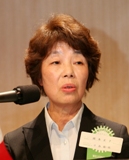��Inochi-no-Denwa (Life Line) Suicide Prevention��
April 23, 2008
Ms. Masako Okamoto,
Secretary General,
The Inochi-no-Denwa Federation
 ��Inochi-no-Denwa (Life Line)�� has been in operation for 35 years. In the past decade, the number of suicides has exceeded 30,000 people each year and there is no foreseeable trend of decline. The suicide rate in Japan is more than twice that of the United States and 3 times that of England. This figure is close to 6 times the number of traffic accident fatalities. This translates into 90 deaths by suicide in Japan each day.
��Inochi-no-Denwa (Life Line)�� has been in operation for 35 years. In the past decade, the number of suicides has exceeded 30,000 people each year and there is no foreseeable trend of decline. The suicide rate in Japan is more than twice that of the United States and 3 times that of England. This figure is close to 6 times the number of traffic accident fatalities. This translates into 90 deaths by suicide in Japan each day.
��As a response to the current situation, in addition to the regular ��Inochi-no-Denwa (Life Line)��, ��Suicide Prevention Life Line�� started 8 years ago. Through this line (the toll free help line ��0120-738-556��), we initiated consultation activities. This has approximately 50 call centers. For the first 6 years following startup in 2001, consultation services were offered during a 1 week period beginning December 1 of each year. In September 2007 the service was changed to being implemented on the 10th of each month, and continues to be offered in the same form today.
��The World Health Organization also considers suicide prevention a top priority issue, and together with the International Association of Suicide Prevention has promulgated the slogan, ��Preventing suicide is everyone��s job�� to the world. Japan has also enacted the ��Law for Basic Suicide Prevention Measures�� and in June 2007, the ��Fundamental Principles for Comprehensive Measures against Suicide�� were decided by the Cabinet. Furthermore, a comprehensive suicide prevention measures center was established within the National Center for Neurology and Psychiatry, Japan.
��The week beginning September 10, 2007 was established as ��Suicide Prevention Week��, and projects such as participation in symposia and community evens were actively pursued. When our activities first began in 2001, if the phrase ��Suicide Prevention�� was used on a poster, no one would display it for us. The national government also refused to accept the phrase in respect to publicity matters. But now, they have actively begun to use our phrase, ��Suicide Prevention��. For example, at Japan Railways not only will they allow us to display the posters free of charge, starting 3 years ago they began cooperating with us in the distribution of ��Suicide Prevention Life Line�� cards within the station facilities.
��The objective of the ��Life Line�� is to prevent an emotional crisis before it happens. Operators at the call center will capture the calls from the hearts of those who call seeking advice. The callers wish to continue to live, and are seeking help, and the operators make efforts to take the posture of sharing time with that caller and listening. Those who call are varied, some quiet, some excited, or some only begin to talk after a little convincing. There are some that have a strong desire to commit suicide, some who want to complain of their heavy anxieties, and some who want to break through their loneliness while on the telephone.
��There are those who call many times, and there are some who are seeking sexual satisfaction through their call. These kinds of invasive phone calls grow in number each year, and although this kind of behavior may be a reflection of the times, the counselors feel battered from time to time as well.
��In the past several years, the number of counseling calls has exceeded 700,000. Since 1988, when statistics on telephonic counseling began, already the number of telephone counseling calls had exceeded 11.5 million. Of the 11.5 million, those people wanting to commit suicide numbered 480,000 calls. We estimate that the number of calls that never got through is several times that number.
��As a principle, we strive to provide psychological support for the emotional crises of our callers by listening and accepting. The suicide problem is not limited to psychiatric specialists. It is important to deal with the issue nationwide. Not only the government but also companies must also address the suicide problem in terms of society as a whole. It is also important for support to come from the various crucial aspects of community, family and friends. Within that, we feel that we are doing our part as a volunteer.
��At the ��Tokyo Life Line��, we have started Internet counseling. The requests for counseling are mostly from young people, contrary to telephonic counseling. With internet counseling, we want to establish a system where calls can come from anywhere across the country, and we are able to provide counseling from a single centralized counseling center.
��The group ��Families of Suicide Victims�� was started to ameliorate the hardships and pain of families left behind and to prevent secondary victims. The group has begun activities in Sendai, Chiba, Nara and Saga Prefectures. Our wish is for companies to take further note of mental health care, and spread the message that ��Preventing suicide is everyone��s job��.